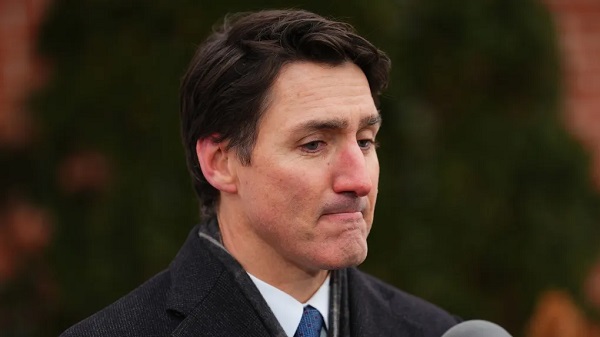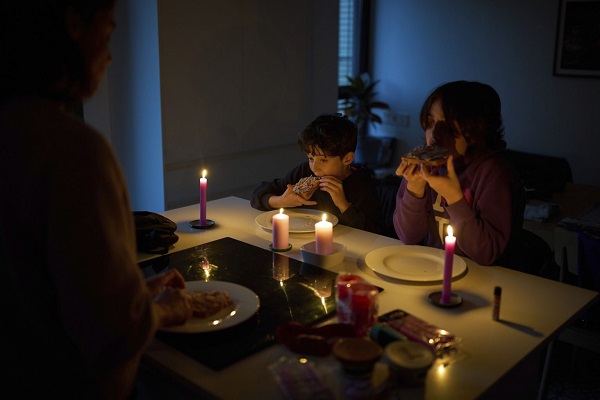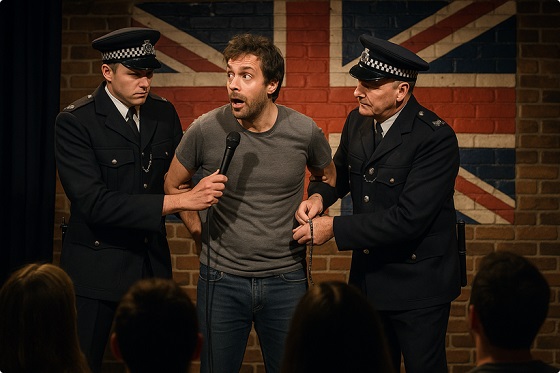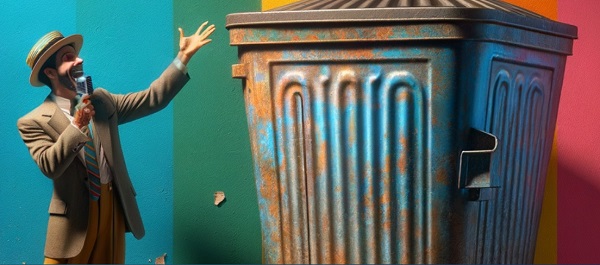National
After a decade spinning in a maelstrom, we’re headed straight into a hurricane.

To choose Trudeau’s successor as the Liberal Party’s new helmsperson, you need only be temporarily resident in Canada and 14 years old, and they don’t even check
Terry Glavin with The Real Story
Après nous, le déluge
It’s over. Well, sort of.
The Trudeau Liberals’ hegemonic hold on Canada’s political, cultural and economic life is now officially and formally winding down. Parliament has been prorogued until March 24, although it isn’t certain that Canada will have a new Parliament with a new prime minister even by June, when Canada is supposed to be hosting the G7, by which time the Liberals are expected to have a new leader too.
Who knows. We’ll get there. Justin Trudeau will be gone, but this is what you should bear in mind as Canada careens and lists and tumbles out of this mess.
The world’s first “postnational state” that Trudeau inaugurated in 2015, with the able assistance of Dominic Barton’s McKinsey & Company and all the resources the Canada-China Business Council threw at the project, was never intended to be some four-year thing to be evaluated by voters in the ordinary course of events.
It was built to be permanent. Its undoing will require one hell of an effort, and in the meantime Donald Trump’s inauguration – a $150 million extravaganza funded by Pfizer, OpenAI, Amazon, Meta and a constellation of cryptocurrency firms – is set for January 20.
That’s just two weeks away, and Trump has pledged to impose what would be a crippling 25 percent tariff on goods from Canada and Mexico “on Day 1” unless measures regarding flows of illegal migrants and drugs are somehow stopped.
We’ll see. The thing is, on Day 1, Canada’s federal government will be locked in the interregnum between the Trudeau epoch and Conservative leader Pierre Poilievre’s new “common sense” order. We’re sitting ducks.
What would a Conservative Great Leap Forward look like?
Poilievre deserves much credit for correctly diagnosing the several possibly fatal wounds the Justin Trudeau decade has inflicted on this country. About that, here’s something I found fascinating over the holiday hiaitus.
It would be worth your time to take in Poilievre’s conversation with Dark Web archdruid Jordan Peterson over the weekend, and then have a listen to the year-end remarks of the lonesome American socialist warlord Bernie Sanders.
Going by my own 90-minute encounter with Peterson a couple of weeks ago I can say that it isn’t easy to keep the conversation going exactly along the lines one might prefer. Not to criticize Peterson’s interviewing style but I can’t fault Poilievre for failing to get into any number of the the existential dysfunctions Canada is enduring.
Even so, Poilievre comes off more like an intelligent and slightly nerdy Canadian version of Bernie Sanders than the doofus Canadian iteration of Donald Trump that the Liberals and New Democrats have so strenously tried and failed to make him out to be.
Fun example: On Saturday, the NDP MP Peter Julian attributed Poilievre’s popularity to a “massive foreign interference strategy. . . the only reason Pierre Poilievre is leader of the Conservative Party right now.” He didn’t say this while drunk in a private conversation among fellow NDPers. Julian said this publicly, on the insufferable Elon Musk’s X, drawing on a thoroughly debunked conspiracy theory from last August.
At least the Conservatives are not crazy people
Today, the Feast of the Epiphany, is the anniversary of the Trumpist insurrection of January 6, 2021, an event that remains an open and profoundly embarrassing wound among Americans. I fully realize that there are some yobbish Putin fanciers at the outer fringes of Canada’s Conservative Party, but give me a break.
Can you imagine Canadian Conservatives storming Parliament Hill, smashing windows and breaking down doors and baying for blood? Of course you can’t. And you certainly can’t imagine Poilievre even coming close to countenancing such conduct, so don’t even try.
I don’t carry any water for Poilievre, but I am persuaded that he’s genuinely and sincerely concerned about the wretched state of affairs to which working-class Canadians have been reduced. Besides, Poilievre isn’t just the best alternative we’ve got. He’s the only alternative. Jagmeet Singh’s New Democrats are a caricature of the party they inherited, so here we are.
My National Post readers and this newsletter’s subscribers will know that I am not bubbling with optimism that Poilievre’s remedies can possibly heal what Canada has sustained. Without getting into all that, I’ve had my say, and while Poilievre’s overall analysis of the Trudeau era’s calamities is grounded in hard facts and driven by empathy, his “Axe the tax, Build the homes, Fix the budget, Stop the crime” remedies are woefully insufficient to the circumstances of the real world.
For starters, the immediate crisis a Poilievre government will face is the major cause of the economic dislocation we’re facing, and he’s been quiet about it: It’s not just that Canada’s housing and jobs economies have no room for roughly three million people in this country who are here on various kinds of “temporary” status. It’s more like 4.9 million people whose visas are going to expire before the end of this year.
No amount of tax-axing is going to deal with this, and you’d need something along the lines of a Mao-era Great Leap Forward to “build the homes” to house them all in residential markets that would be even vaguely affordable for most people. And to do that you’d have to tear down Canada’s cities and build a grim Leninplatz on top of each heap of rubble.
Here’s just one other little thing that could stand in the way of any effective legislative agenda that Poilievre might want to embark upon. Almost all the current occupants of the Upper Chamber are senators appointed by Justin Trudeau. So, that’ll be fun: on top of everything else, the prospect of forcing a constitutional crisis just to get anything done.
Not to be dreary, but about the brokenness, but see Notes on the Coming Disturbances, and a earlier assessment: Nearing Nine Years Since Year Zero, So there’s all that.
It’s not just Canada that’s broken. It’s the Liberal Party.
To build the new postnational state in place of what we’ve been badgered to understand as the genocidal old-stock white supremacist settler-state patriarchy that Trudeau so gallantly set out to save from itself, the Liberal Party had to be refashioned to serve as the conduit to Parliamentary power and privilege. See It’s 2025. Welcome to the Thunderdome.
Bear in mind that Justice Marie-Josée Hogue’s Public Inquiry into Foreign Interference in Federal Electoral Processes and Democratic Institutions is expected to issue its final report before the end of this month. The inquiry’s long-delayed and filibustered timetable had anticipated that Hogue’s proposed structural changes would be in place well before what was presumed to be an October 2025 federal election.
Here’s the thing about that. Never mind that owing to Team Trudeau’s rewriting of the party constitution we still don’t know who elected Trudeau to the leadership of the Liberal Party in the first place, and there’s been no inquiry into the massive infusions of weirdly coordinated Mandarin-bloc donations to Trudeau’s own riding association warchest in the aftermath of his 2015 capture of a Parliamentary majority.
See: Liberals are leaving an ungodly mess for Poilievre’s Conservatives to clean up; New report details just how easily China can mess with Canadian elections. In that piece, and in the Thunderdome newsletter, I refer at length to the findings in this in-depth analysis published by the Canadian International Council: Beyond general elections: How could foreign actors influence the prime ministership?
While all the talking-head punditry and chat-show panelists are preoccupied with speculation about just who might emerge as Justin Trudeau’s successor, here’s just one fact that has gone unnoticed. If you simply happen to be domiciled even temporarily in this country, you only have to be 14 years old to cast your vote for the next leader of the Liberal Party of Canada.
All for now.
Yes, this was a newsletter with no paywall.
To keep this project going, do please take up a paid subscription.
Energy
Canada following Europe’s stumble by ignoring energy reality

Family in Spain eating by candlelight during a blackout, April 2025
From Resource Works
Canada’s own 2024 grid scare proves we’re on the same path unless we change course.
Europe’s green-energy unraveling is no longer a distant cautionary tale. It’s a mirror — and Canada is already seeing the first cracks.
A new Wall Street Journal investigation lays out the European story in stark detail: a continent that slashed emissions faster than anyone else, only to discover that doing so by tearing down firm power before its replacement existed comes with brutal consequences — collapsing industry, sky-high electricity prices, political fragmentation, and a public increasingly unwilling to subsidize wishful thinking.
The tragedy isn’t that Europe tried to decarbonize quickly.
The tragedy is how they did it: by insisting on an “or” transition — renewables or fossil fuels — instead of what every energy-literate nation outside Europe pursued: renewables and fossil fuels, working together while the system evolves.
And here’s the uncomfortable truth:
Canada has already had its first European-style crisis. It happened in January 2024.
Canada’s early warning: the January 2024 electricity crunch
Most people have already forgotten it, because our political class desperately wanted you to. But in January 2024, Western Canada came within a whisker of a full-blown energy security breakdown. Alberta, Saskatchewan, and B.C. were stretched to their limit. The grid was under cascading stress. Contingency plans were activated. Alberta came terrifyingly close to rolling blackouts.
It wasn’t caused by climate change. It wasn’t caused by a mysterious cyberattack.
It was caused by the same structural brittleness now crippling Europe:
- Insufficient firm power, after years of political messaging that we could “electrify everything” without adding real generating capacity.
- Overreliance on intermittent sources not backed by storage or gas.
- A planning system that punted risk into the future, betting the grid could be stretched indefinitely.
The January 2024 event was not a blip. It was a preview.
Our European moment in miniature.
But instead of treating it as the national wake-up call it should have been, B.C. did something telling — and deeply damaging.
The B.C. government’s response: attack the messenger
Just a couple of years ago, an economist publicly warned about the economic price of emerging system vulnerabilities due to a groaning stack of “clean economy” policies.
The B.C. government didn’t respond with data, evidence, or even curiosity. Instead, a cabinet minister used the safety of legislative privilege — that gold-plated shield against accountability — to launch nasty personal attacks on the economist who raised the concerns, which themselves had originated in the government’s own analysis.
No engagement.
No counter-analysis.
No willingness to consider the system risks.
Just slurs — the very definition of anti-intellectual governance.
It was a moment that told the whole story:
Too many policymakers in this province believe that energy systems obey politics, not physics.
Physics always gets the last word.
Europe shows us what political denial turns into
The WSJ reporting couldn’t be clearer about the consequences of that denial:
- Germany: highest domestic electricity prices in the developed world.
- U.K.: highest industrial electricity rates among major economies.
- Industrial flight: chemical plants closing, data centres frozen, major players hinting at exiting Europe entirely.
- Grid instability: wind farms paid tens of millions not to generate because the grid can’t handle it.
- Public revolt: rising support for parties rejecting the entire green-transition agenda.
- Policy whiplash: governments rushing to build gas plants they swore they’d never need.
Europe is now an object lesson in how good intentions, executed poorly, can produce the exact opposite of what was promised: higher prices, higher volatility, declining competitiveness, and a public ready to abandon climate policy altogether.
This is precisely what January 2024 warned us about — but on a continental scale.
The system cost we keep pretending doesn’t exist
Every serious energy expert knows the truth Europe is now living: intermittent renewables require massive amounts of redundant capacity, storage, and backup generation. That’s why the U.K. now needs 120 gigawatts of capacity to serve a demand previously met with 60–70 gigawatts, even though electricity use hasn’t meaningfully grown.
This is the math policymakers prefer not to show the public.
And it’s why B.C.’s refusal to have an honest conversation about firm power is so dangerous.
If we electrify everything without ensuring affordable and abundant natural gas generation, we’re not building a green future.
We’re building Europe, 10 years early.
The lesson for Canada — especially for B.C.
Here is what Europe and January 2024 together say, in one clear voice:
1. There is no energy transition without firm power.
Renewables are part of the system, but they don’t run the system. Natural gas does. Hydro does. Nuclear does. Pretending otherwise is how you end up with rolling blackouts.
2. Political denial makes crises worse.
When ministers attack economists instead of answering them, it signals that ideology is running the show. Europe learned the cost of that. We will too, unless we change course.
3. Affordability is the foundation of public consent.
Europe lost the room. Once people see their bills double while factories close, the climate agenda becomes politically radioactive.
4. B.C. has an advantage Europe would kill for.
Europe dreams of having an abundant, local, low-carbon firm-power fuel like northeastern B.C.’s natural gas. We treat it like a political liability. That’s not strategy. It’s negligence.
5. The transition will fail if we don’t treat electricity like the national security asset it is.
Without energy, there is no industry.
Without industry, there is no prosperity.
Without prosperity, there is no climate policy that survives the next election cycle.
What we need now
Canada must embrace an “and” strategy:
Renewables and natural gas. Electrification and realism. Climate ambition and economic competitiveness.
January 2024 showed us the future in a flash. Europe shows us the end state if we keep ignoring the warning.
We can still choose something better. But only if we stop pretending that energy systems bend to political narratives — and start treating them with the seriousness they demand.
Resource Works News
Alberta
Carney’s pipeline deal hits a wall in B.C.

This article supplied by Troy Media.
Carney’s attempt to ease Canada’s dependence on the U.S. stirs a backlash in B.C., raises Indigenous concerns and rattles his own party
The Memorandum of Understanding (MOU) between Prime Minister Mark Carney and Alberta Premier Danielle Smith has opened a political hornet’s nest, exposing deep divisions within the Liberal Party and forcing a national debate that has been avoided for years.
Carney was under mounting pressure to respond to U.S. tariffs that threaten to carve billions out of Canada’s economy. The United States buys more than 95 per cent of Canada’s oil exports, leaving the country highly exposed to U.S. policy decisions. That pressure is now driving his push for a route to the Pacific, a project that could change Canada’s economic future but also destabilize his already fragile minority government.
Carney knows the political risk. His government could fall at any time, which only raises the stakes. Even so, he has pressed ahead. The agreement with Alberta lays early groundwork for a new pipeline to the Pacific. It would expand the oil sands, ease some environmental obligations and revive a proposal industry leaders have pushed for years.
The route is far from settled, but it is expected to run to B.C.’s northern coast and open access to Asian buyers. A Pacific route would finally give Canada a direct path into Asian energy markets, where demand remains strong and prices are often higher than in the United States.
If Carney expected broad support, he did not get it, especially in British Columbia. Because B.C. is the only province with a deep-water port capable of handling large crude carriers, it is the only path a west-coast pipeline can take. The province is now the central battleground, and whether the project succeeds will depend on what happens there.
B.C. Premier David Eby criticized the lack of consultation. “It would have been good for B.C. to be at the table,” he said, warning that the project risks undermining Indigenous support for the province’s liquefied natural gas plans. He also noted that the pipeline has no private backer and no commitments from First Nations, two obstacles that have tripped up projects before.
The backlash quickly spread to Ottawa. Steven Guilbeault, the former environment minister and the most prominent environmentalist ever to serve in a federal cabinet, resigned from cabinet in direct response to the MOU. He said the proposed pipeline “would have major environmental impacts”. Green Party Leader Elizabeth May said his departure “dashes the last hope that Mark Carney is going to have a good climate record ever.”
Several B.C. Liberal MPs echoed concerns about the political cost. CBC News reported anger inside the caucus, with some MPs “seething” over the agreement and worried about losing climate-focused voters.
The voters those MPs fear may not be as opposed as they think. An October Angus Reid Institute survey found that a solid majority of Canadians support a pipeline from northern Alberta to the northwest B.C. coast. In British Columbia, support outweighs opposition by a wide margin. That challenges Eby’s claim that the project lacks public backing. Carney may have more room to manoeuvre than his critics admit.
The most significant challenge, however, comes from Indigenous leaders. British Columbia is the only province that has formally adopted the United Nations Declaration on the Rights of Indigenous Peoples (UNDRIP) into law, giving First Nations a stronger legal position in major project decisions. Court rulings over the past two decades have affirmed a duty to consult and, in some cases, accommodate Indigenous communities, giving them major influence over large projects.
A group representing Coastal First Nations in B.C. said the pipeline “will never happen”. The Union of B.C. Indian Chiefs said it is “loudly objecting” to the MOU, arguing it was drafted without involvement from coastal First Nations and does not meet consultation standards outlined in UNDRIP. “The answer is still no and always will be,” said UBCIC Grand Chief Stewart Phillip. He also said lifting the crude oil tanker ban would amount to bulldozing First Nation rights. Without Indigenous consent, the project cannot proceed, and Carney knows this is the single largest barrier he faces.
Carney’s reasoning is straightforward. The long-term danger of relying on one market outweighs the short-term turbulence created by the pipeline fight. The MOU suggests Ottawa is prepared to reconsider projects once thought politically impossible in order to protect Canada’s economic future. He is betting that doing nothing is the bigger risk.
Whether this pipeline moves forward is uncertain, and the obstacles are real. One fact, however, remains clear. Canada cannot keep betting its stability on a single market.
Toronto-based Rashid Husain Syed is a highly regarded analyst specializing in energy and politics, particularly in the Middle East. In addition to his contributions to local and international newspapers, Rashid frequently lends his expertise as a speaker at global conferences. Organizations such as the Department of Energy in Washington and the International Energy Agency in Paris have sought his insights on global energy matters.
Troy Media empowers Canadian community news outlets by providing independent, insightful analysis and commentary. Our mission is to support local media in helping Canadians stay informed and engaged by delivering reliable content that strengthens community connections and deepens understanding across the country.
-

 Censorship Industrial Complex1 day ago
Censorship Industrial Complex1 day agoA Democracy That Can’t Take A Joke Won’t Tolerate Dissent
-

 Business1 day ago
Business1 day agoRecent price declines don’t solve Toronto’s housing affordability crisis
-

 Daily Caller1 day ago
Daily Caller1 day agoTech Mogul Gives $6 Billion To 25 Million Kids To Boost Trump Investment Accounts
-

 Artificial Intelligence2 days ago
Artificial Intelligence2 days agoThe Emptiness Inside: Why Large Language Models Can’t Think – and Never Will
-

 Business1 day ago
Business1 day agoCanada’s future prosperity runs through the northwest coast
-

 Business1 day ago
Business1 day agoOttawa’s gun ‘buyback’ program will cost billions—and for no good reason
-

 MAiD10 hours ago
MAiD10 hours agoFrom Exception to Routine. Why Canada’s State-Assisted Suicide Regime Demands a Human-Rights Review
-

 National1 day ago
National1 day agoCanada Needs an Alternative to Carney’s One Man Show










